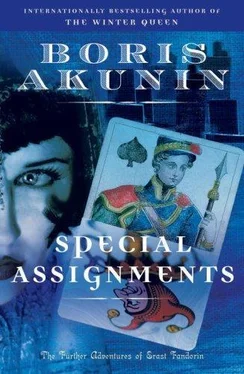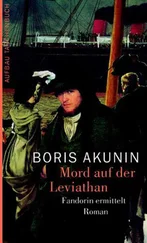'I'm thinking of trying Guatemala,' Momos told her gleefully. 'I read in the newspapers they've had another coup. The Guatemalans have had enough of the republic; they're looking for a German prince to put on the throne. Perhaps I might suit?' And with a wave of farewell, he disappeared through the door.
The trial of the spinster Maria Nikolaevna Maslennikova, former actress of the St Petersburg Theatres, accused of fraud, criminal conspiracy and escaping from arrest, took place at the very end of April, in that blissful period after Easter when the branches are covered with succulent, swelling buds and the fresh grass is creeping untidily along the edges of roads that are still soft but beginning to dry out.
Her trial did not attract the attention of the broad public, since it was not a major case, but there were half a dozen or so reporters sitting in the courtroom - there had been vague but persistent rumours that the failed lottery swindle was connected in some way with the famous Jack of Spades, and so the editors had sent along their representatives just in case.
Anisii was one of the first to arrive and he took a place as close as possible to the dock. He was thoroughly agitated, since he had thought often during the previous two months about the jolly young lady Mimi and her unfortunate fate; and now it seemed that the final resolution had arrived.
In the meantime there had been quite a few changes in the life of the former courier. After Erast Petrovich had let the Jack go completely free, there had been an unpleasant scene at the Governor's residence. Prince Dolgorukoi had flown into an indescribable rage, refused to listen to anything and even shouted at the Court Counsellor, calling him a 'self-willed boy'. The Chief had immediately handed in his written resignation, but it had not been accepted because, when the Prince cooled down, he had realised just how much embarrassment he had been spared by the prudence of his Deputy for Special Assignments. The Jack of Spades' testimony concerning the case of Lord Pitsbrook would have shown the Prince up in an unfavourable light, not only to the people of Moscow but also to the Higher Spheres, in which the obdurate Governor-General had no few enemies who were only waiting for him to commit some blunder. And to become an object of fun was even worse than a blunder, especially if you were already seventy-six and there were others keen to take your place.
In fact, the Governor had come to the house on Malaya Nikitskaya Street, begged Erast Petrovich's pardon and even recommended him for yet another Order of St Vladimir - not for the Jack of Spades, of course, but for 'outstandingly zealous service and special work'. The Prince's generosity had even extended to Anisii: he had received a substantial financial reward, enough to settle into the new apartment, get a few treats for Sonya and acquire a complete set of uniforms. He had used to be plain, simple Anisii, but now he was His Honour Collegiate Registrar Anisii Pitirimovich Tulipov.
Today he had come to the court in his brand-new summer uniform, never worn before. Summer was still a long way off, but Anisii looked very impressive in his high-collared white jacket with gold trimming on the buttonholes.
When the accused was brought in, she noticed the white uniform immediately, smiled sadly, as if to an old acquaintance, and sat down with her head lowered. Mim-ochka's hair (Mimochka - that was how Anisii thought of her to himself) had not yet grown back properly and it was gathered into a simple little knot at the back of her head. The accused had put on a simple brown dress and she looked like a small grammar-school girl facing a strict school-council meeting.
When Anisii saw the jurors glancing sympathetically at the modest girl, his spirits rose slightly. Perhaps the sentence would not be too severe?
However, the prosecutor's opening address left him horrified. The counsel for the prosecution - a rubicund, heartless careerist - painted Mimochka's character in the most scandalous colours, described in detail the revolting cynicism of the 'charitable lottery' and demanded three years of penal servitude for the spinster Maslennikova, plus five years of exile in the less distant regions of Siberia.
The alcoholic actor who had played the part of the chairman of the lottery was released by the court because his guilt was so insignificant and he appeared as a witness for the prosecution. It looked as if Mimochka was destined to carry the can alone for everyone. She lowered her little golden head on to her folded hands and began crying silently.
Then Anisii took a decision. He would follow her to Siberia, find some place to live there and provide the poor girl with the moral support of his faithful devotion. Then, when she was released early, they would marry and then ... and then everything would be just fine.
And what about Sonya?' his conscience asked. 'Will you put your only sister, an invalid needed by no one, in the poorhouse?'
'No,' Anisii answered his conscience. ‘I’ll throw myself at Erast Petrovich's feet - he's a noble man; he will understand.'
Things had worked out quite well for Sonya. Fandorin's new maid, the big-bosomed Palasha, had become very fond of the cripple. She looked after her and kept an eye on her, and wove her plaits for her. Sonya had even started saying a few words: 'ribbon' and 'comb'. The Chief would surely not abandon the helpless creature, and afterwards Anisii would take her to his place, just as soon as he was settled ...
At this point the judge gave the floor to the counsel for the defence and for the time being Tulipov set aside his desperate thoughts and gazed hopefully at the barrister.
To be quite honest, he did not look very promising: swarthy-skinned, with a long, drooping nose and a stoop. They said he had been hired from the famous St Petersburg firm of Rubinstein and Rubinstein by a person unknown and had the reputation of an expert in criminal matters. However, the defender's appearance was distinctly unprepossessing. When he stepped out to the front, sneezed loudly into a pink handkerchief and then hiccupped as well, Anisii was seized by foreboding. Oh, that mean rogue Momos had been too miserly to hire a good lawyer; he'd sent some mangy scruff, and a Jew into the bargain. Just look at the way those anti-Semitic jurors were glowering at him; they wouldn't believe a single word he said.
Tulipov's neighbour on the left, an impressive gentleman with a bushy beard and gold-rimmed spectacles who looked like a Kalmyk, examined the lawyer, shook his head and whispered conspiratorially to Anisii: 'He'll ruin the whole case, you'll see.'
The defender stood facing the jurors, pressed his hands to his sides and declared in a sing-song accent: 'Ah, Mr Judge and gentlemen of the jury, can you explain to me what this man has been talking about for the best part of an hour?' He jabbed his thumb derisively in the direction of the prosecutor. 'I would be interested to learn what all the commotion is about. On what is the money of honest taxpayers, such as you and I, being spent?'
The 'honest taxpayers' looked at this over-familiar windbag with evident distaste, but the barrister was not embarrassed in the least.
'What does the prosecution have?' he inquired sceptically. A certain swindler, whom, just between you and me, our valiant police have failed to find, organised a fraud. He hired this sweet, modest young lady to give out tickets, saying that the money would go to a good cause. Look at this young woman, gentlemen of the jury. I appeal to you: how is it possible to suspect such an innocent creature of such villainy?'
The jurors looked at the accused. Anisii looked too, and sighed. The case looked hopeless. Perhaps somebody else might have moved the court to pity, but not this hook-nose.
Читать дальше











